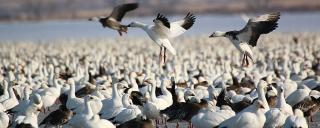Lesser Snow Goose (and Ross' Goose)

Fact Sheet
| Category | Fact |
|---|
| Scientific Name |
Chen caerulescens (Ross' Goose - Chen rossii) |
| Wing spread |
58 inches |
| Body length |
29 inches |
| Weight |
6 pounds |
| Description |
Snow geese occur in two color phases, white and blue, and both sexes are identical within each phase. In the white phase, geese are all white with black wing tips. Blue geese are blue-gray with a white head. Ross’s geese are virtually identical to white phase snow geese. Ross’s geese are a distinct species that weigh 3-4 pounds and have smaller, stubbier bills. |
| Nesting Habitat |
Snow geese occur in two color phases, white and blue, and both sexes are identical within each phase. In the white phase, geese are all white with black wing tips. Blue geese are blue-gray with a white head. Ross’s geese are virtually identical to white phase snow geese. Ross’s geese are a distinct species that weigh 3-4 pounds and have smaller, stubbier bills. |
| Clutch size |
4 eggs |
| Incubation period |
23 days |
| Status in North Dakota |
Snow geese are abundant during migration seasons, but do not nest in North Dakota. |
| Food habits |
Snow geese graze heavily on foliage and tubers on tundra breeding grounds. During migration and on wintering grounds they feed heavily on agricultural crops. |
| Fun Facts |
Agricultural crops, particularly rice on wintering grounds, provide an abundant food source. This has allowed the snow goose population to rapidly expand. As a result, an overabundance of snow geese has led to the destruction of much of the vegetation on breeding grounds. |


